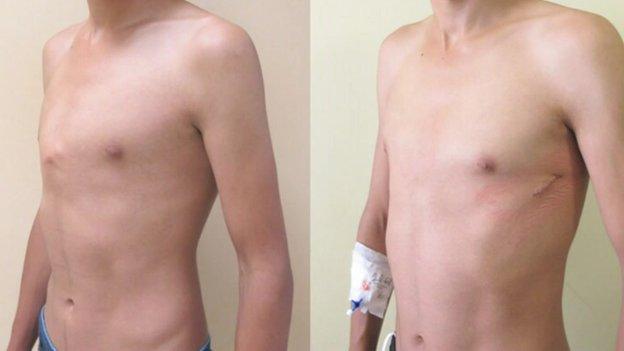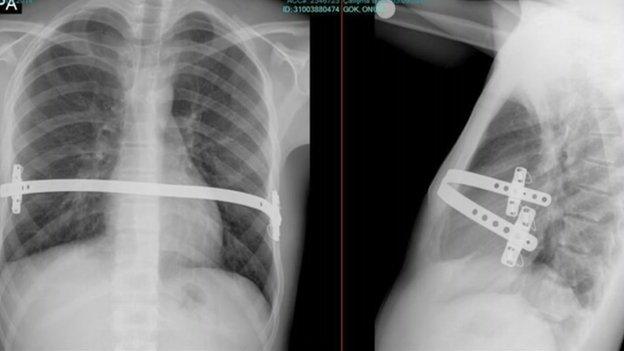Pioneering chest deformity op carried out at Cardiff hospital
- Published
The first procedure at Cardiff's University Hospital of Wales helps people with pectus carinatum
A Welsh hospital has become the first in the UK to offer a pioneering new treatment for patients with chest deformities.
The first procedure at Cardiff's University Hospital of Wales was watched by specialists from a theatre gallery and over a video link.
A specially designed metal brace is inserted through two small incisions in the side of the chest to reshape it.
The operation helps people with pectus carinatum, known as pigeon chest.
The condition affects the breastbone and ribs which appear pushed out.

Before and after... a patient's chest before and after the procedure has been completed
Prof Mustafa Yuksel, a consultant cardiothoracic surgeon from Istanbul in Turkey, designed the brace and has carried out over 150 similar operations in his home country.
He was invited by the UHW and Cardiff University's Welsh Institute for Minimal Access Therapy (WIMAT) to bring his expertise to Wales and he now also teaches at the university.
"The bar I designed is easier, safer and better to use," Prof Yuksel said.
"The other type of operation is very invasive. You cut the ribs, take them out, correct them and put them in again.
He said the traditional method was a "very big procedure that can take sometimes six or eight hours".
"This takes only half an hour and the patient is able to leave hospital two days later," he added.
After the metal brace is inserted, the surgeon pushes down on the chest until it has a more normal appearance.
The brace is removed under general anaesthetic after around two years by which time the chest should be permanently reshaped.

The brace attached to a patient's chest is removed after about two years

Pectus carinatum / pigeon chest
In 60 seconds: Steffan Messenger explains the condition and the new treatment
The condition affects around one in every 1,500 children and is more common in boys than girls.
It can become more obvious as children grow and cause serious psychological effects including depression, negative body image and low self-esteem.
In some cases it can also affect lung function.

A similar procedure to the one performed at UHW is already available to treat pectus excavatum, where the chest appears sunken.
One man in his early twenties with the condition, who did not wish to be named, spoke to the gathering of specialists visiting UHW.
"It really affected me mentally, especially when I started getting involved with girls," he said.
"I was always a bit reserved but then I managed to meet a girl I actually liked. When she saw my chest though it put her right off. And that hit me really hard.
"Since I've had the operation I've managed to get my confidence back."